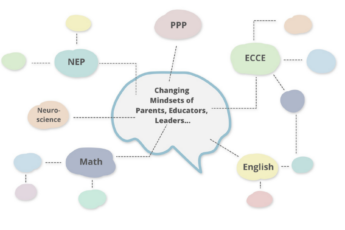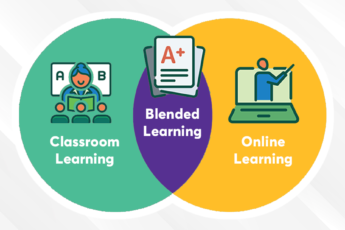Building Foundational Literacy and Numeracy Skills in India

The fundamental ability to read and perform basic numerical operations is an essential requirement that serves as the cornerstone of all future learnings. This acquisition occurs when the young learner is between 3-7 years old, a period critical to brain development. The skills developed in early childhood will create a base for enhancing greater cognitive development, socio-emotional skills, and reasoning.
Reading fluency allows students to comprehend text more easily and efficiently. Fluent readers exhibit several characteristics, including smoother voice inflections, faster word recognition, longer reading times with fewer pauses and increased eye contact with the text. Similarly, counting also helps children understand number sequences and groupings more efficiently because they learn how to identify patterns within a sequence or set by using their fingers or other physical objects as markers for each number in the sequence.
🖊️ Education in Early Years
In their early years, children are curious and energetic. They have an insatiable curiosity about the events around them. To develop their learning abilities and make sense of the world, teachers should provide them with opportunities to explore their environment and use their sensory capacities. These hands-on experiences help children better grasp basic concepts. In the process, they learn to make and test their own theories and explanations.
Children’s capacity for learning in the early years is enormous. Their brains are developing rapidly, so they can absorb a great deal of information and knowledge during this time. They also have remarkable powers of observation and memory that enable them to memorize information easily.
For example, when a child pushes a heavy cart across a room, they learn that pushing makes it go in one direction; pulling makes it go in another direction, and stopping makes it stop moving altogether. Through these experiences, children begin to develop their thinking skills as they develop their language skills through listening and talking with others and reading books together as a class or individually at home with parents. In addition, building blocks and puzzles allow children to discover fundamental physics principles, such as gravity or balance.
For foundational literacy and numeracy (FLN) the role of educators and parents is essential for providing adequate supervision and guiding children toward appropriate choices during playtime activities. Adults should encourage children’s curiosity by asking open-ended questions. Allowing your children time to explore their environment at their own pace, rather than rushing them through meal or nap times, will help them feel comfortable trying new things.
🖊️ State of FLN in India
Around 260 million children are studying in more than 1.5 million schools across India at present. From these, over 70% of children in Class 3 do not have basic reading and arithmetic skills. Data shows that each year, an estimated 6 million children complete 8 years of compulsory schooling in India with alarmingly low learning levels. Such worrying trends in the formative years of schooling, when the cognitive skill development is the highest, can greatly destabilize a nation.
However, the latest FLN report released in December 2021 highlights the role of NEP 2020 early intervention projects such as NIPUN Bharat, leading to long-term improved learning outcomes. The State of Foundational Literacy and Numeracy in India Index was established to measure the effect of early learning programs. It measures the results on five pillars, each with 41 indicators. The 5 pillars are Access to Education, Learning Outcomes, Basic Health Governance and Educational Infrastructure.
According to the scorecards, Kerala (67.95) and West Bengal (58.95) are the top-scoring regions in Small and Large states, respectively. These were followed by Lakshadweep (52.69) and Mizoram (51.64). On the other hand, the index showed only 4 UTs and 17 states scored above the national average(48.38). States that performed poorly on the index include Odisha (45.58), followed by Jharkhand (45.28), Madhya Pradesh (38.69), Uttar Pradesh (38.46) and Bihar (36.81).
Without the basic skills of foundational literacy and numeracy, the benefits of all future learning and future success become void. To truly become a self-reliant nation, India needs to turn the spotlight towards strengthening the existing ECCE programs to highlight foundational learning from the teacher training as well as the curriculum perspective.
🖊️ The Way Forward
Investing in quality ECCE to boost foundational learning improves the attainment of the above gateway skills, which pave the way for more robust future learning prospects and employability. Providing foundational skill development across the grassroots levels is an effective equalizer, allowing for inclusivity in early education and leading to better economic gains for the country as a whole aside from improving the learning outcomes of individual children. During the release of NEP 2020, the government also emphasized empowering our nation by increasing initiatives toward early childhood education.
Square Panda is transforming the landscape of early education, helping students to learn new concepts at a deeper level using engaging storytelling, games and play. Our foundational learning programs equip teachers with resources that make learning fun and engaging. To know more about how we are contributing to foundational literacy and numeracy in India, visit ecce.squarepanda.in/.




Leave a Comment